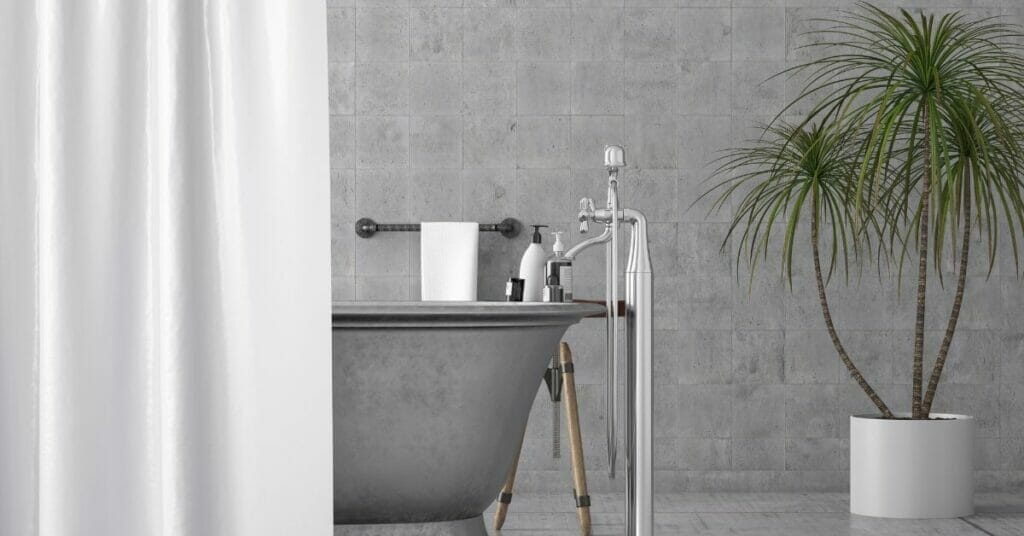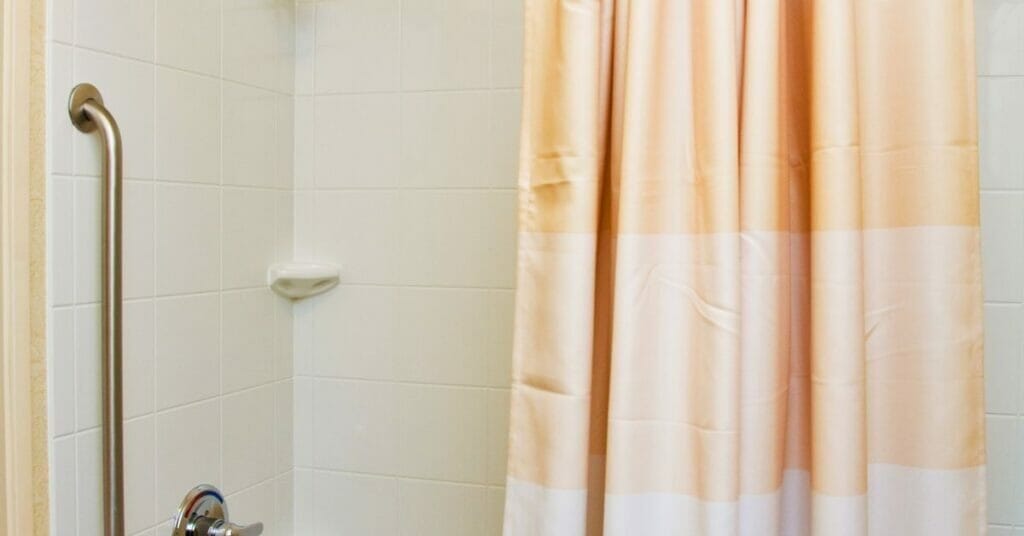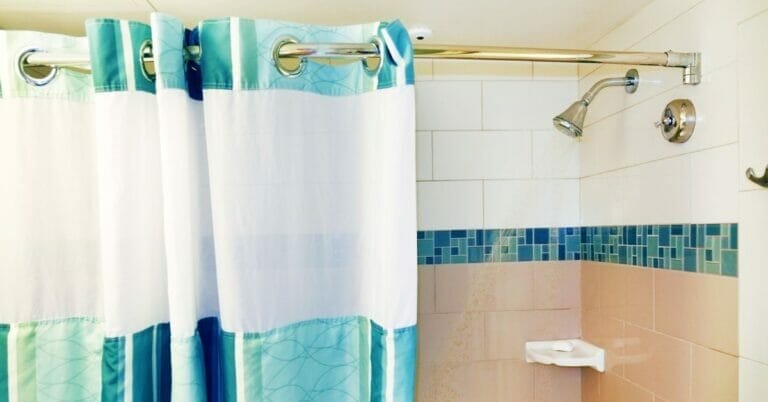PEVA shower curtains have been gaining popularity in recent years as a more eco-friendly alternative to traditional vinyl shower curtains.
But, as with any product, safety is a top concern. With numerous reports of PEVA curtains emitting harmful chemicals, it’s important to know: Are PEVA shower curtains safe to use in your home?
To your concern, let me tell you:
PEVA shower curtains are totally safe to use in the bathroom as they are made from a non-toxic, chlorine-free, and eco-friendly material.
However, it’s important to note that some of these curtains may emit small amounts of volatile organic compounds (VOCs), which can have negative health effects if inhaled in large quantities.
To ensure safety, look for PEVA curtains certified by reputable organizations such as the EPA or made without phthalates.
In this article, we’ll explore the safety of PEVA shower curtains and their potential health risks. Get ready to dive into the facts and make an informed decision about your bathroom decor.
What is PEVA Material?

PEVA (Polyethylene Vinyl Acetate) is a type of plastic material. This material is made without chlorine or other hazardous chemicals and is considered a safer alternative to traditional vinyl.
It is commonly used in the production of shower curtains, tablecloths, and other household items that require waterproofing and durability. It is lightweight, waterproof, and easy to clean, making it an attractive option for many consumers.
However, PEVA material is also affordable and widely available, making it a popular choice for those looking to create a more sustainable home.
Whether you’re looking for a shower curtain, tablecloth, or any other household item, you will find a PEVA option that suits your needs.
Is PEVA Fabric or Plastic?
PEVA is a plastic material. It is a thermoplastic polymer that is made by combining polyethylene and vinyl acetate.
Despite being a plastic material, PEVA is a safer alternative than traditional vinyl or PVC as it is made without chlorine or other hazardous chemicals.
Is PEVA Non-Toxic?
Yes, PEVA is considered to be non-toxic. It does not contain any harmful chemicals, such as BPA or phthalates, that have been linked to health problems.
Moreover, PEVA is free from chlorine and other harsh chemicals that can cause harm to the environment.
Is PEVA Safe for Babies & Children?
If you’re wondering whether PEVA is safe for babies and children, let me tell you, it is made without toxic chemicals and does not emit any hazardous fumes. So it is a safer option for households with young children.
Is PEVA Eco-Friendly?
PEVA is environmentally friendly because no toxic chemicals are used in its production. So, it is safe for the environment and doesn’t cause any potential health risks for humans too.
Additionally, PEVA is recyclable and biodegradable, making it a more sustainable option for creating a greener home.
Is PEVA Recyclable?
Yes, PEVA is recyclable. This makes it a more sustainable and environmentally friendly option than traditional vinyl, which is not recyclable. By choosing PEVA, you can reduce your carbon footprint and help to create a greener world for future generations.
Why Does PEVA Make a Good Shower Curtain?

PEVA makes a great shower curtain due to its combination of waterproofing, safety, and eco-friendly properties. Here’s why:
Waterproof:
PEVA is a waterproof material, making it ideal for use in the bathroom. With a PEVA shower curtain, you won’t have to worry about water damage or mold growth.
This is the thing that distinguishes it from the competition, making it the best option for those looking for a durable and long-lasting shower curtain.
Made without Chlorine:
PEVA is made without chlorine or other hazardous chemicals, so you can be sure that it is a safer alternative to traditional vinyl shower curtains.
This means that PEVA shower curtains are free of toxic fumes and harmful chemicals, and you can use them without worrying about the health of your family members..
Made with a cheap but durable material:
PEVA is a cost-effective material that is both cheap and durable. It is lightweight, easy to clean, and requires very little maintenance.
So, if you’re looking for a budget-friendly shower curtain that doesn’t break the bank, the PEVA shower curtain is the way to go.
How PEVA Compares to Other Materials
PEVA is a versatile material that compares favorably to other popular shower curtain materials, including polyester and vinyl. Here’s how PEVA compares to these two materials:
PEVA vs Polyester
PEVA is a non-toxic and environmentally friendly alternative to polyester shower curtains. Unlike polyester, made from synthetic fibers and not biodegradable, PEVA is recyclable and biodegradable. This makes it a great choice for those looking for an eco-friendly option.
Read More: Are Polyester Shower Curtain Safe?
PEVA vs Vinyl
PEVA is a safer alternative to vinyl shower curtains. Vinyl is made from PVC and contains hazardous chemicals such as phthalates and lead that cause major health risks for people.
However, PEVA filters the use of chlorine or other hazardous chemicals in its production. This makes it a great option for households with young children or pets.
Other Shower Curtain Alternatives
PEVA shower curtains are an incredible option, but they are not the only alternative available.
The popular options that can be the best substitute for PEVA are cotton, hemp, and linen shower curtains. Here’s how these materials compare to PEVA:
Cotton Shower Curtain
Cotton shower curtains are soft, absorbent, and breathable, making them the best choice for those who want a comfortable and natural feel in their bathroom.
However, cotton shower curtains can be prone to mold and mildew growth so they may require more maintenance and cleaning than PEVA shower curtains.
Hemp Shower Curtain
Hemp shower curtains are a natural and eco-friendly alternative to PEVA shower curtains. Hemp is naturally anti-microbial and resistant to mold and mildew, making it a great choice for those who want a safe and environmentally friendly option. However, hemp shower curtains can be more expensive than PEVA shower curtains.
Linen Shower Curtain
Linen shower curtains are a stylish and sophisticated option that can add a touch of elegance to any bathroom. Like cotton, linen is a natural and breathable material that is soft to the touch. However, like hemp, linen shower curtains can be more expensive than PEVA curtains.
What Material to Choose for a Shower Curtain?
Are you lost in choosing the best material for a shower curtain?
But not anymore, because I have given some important recommendations below that help you choose the best material for your shower curtain.
Let’s take a deep look at them.
- Durability: Look for a material that is waterproof and resistant to mold and mildew, such as PEVA, vinyl, or hemp.
- Safety: If you have young children or pets, choose a material that is free of hazardous chemicals, such as PEVA or cotton.
- Eco-Friendliness: If you’re concerned about the environment, look for a material that is recyclable and biodegradable, such as PEVA, hemp, or linen.
- Style: Consider the overall style and aesthetic you want for your bathroom. Consider cotton, hemp, or linen if you’re looking for a natural, comfortable, or sophisticated look. If you’re looking for a stylish, modern look, consider PEVA or vinyl.
Ultimately, the right material for your shower curtain will depend on your specific needs and preferences. Take the time to consider your options and choose a material that will meet your needs and provide a safe and comfortable space in your bathroom.
FAQs Related To PEVA Shower Curtains
Is there BPA in PEVA?
No, PEVA does not contain BPA (Bisphenol A), which is a chemical found in some plastics that has been linked to health concerns.
Is PEVA better than PVC?
PEVA and PVC are similar in terms of durability and waterproofing, but PEVA is considered a safer and more environmentally friendly alternative to PVC. This is because PEVA is free of hazardous chemicals such as phthalates and BPA, while PVC contains these chemicals.
Which is safer, silicone or PEVA?
PEVA is a safer option than silicone in terms of environmental impact, as PEVA is biodegradable and recyclable, while silicone is not. However, in a broader sense, both PEVA and silicone are safe for human exposure and free of hazardous chemicals.
Is PEVA 100% waterproof?
Yes, PEVA is a waterproof material commonly used in shower curtains, tablecloths, and food storage containers.
Does PEVA mold?
PEVA is resistant to mold and mildew but can still develop mold if not cleaned regularly or if exposed to moisture for extended periods.
Can you wash PEVA in a washing machine?
Yes, PEVA shower curtains can be machine washed, but washing them on a gentle cycle is recommended to air dry them rather than using a dryer.
Does PEVA smell?
PEVA is an odorless material commonly used in shower curtains, tablecloths, and food storage containers. However, if your PEVA shower curtain has been exposed to moisture for extended periods of time, it may develop a musty smell that can be difficult to remove. To prevent this, clean your PEVA shower curtain regularly and allow it to air dry completely after use.
Conclusion
In conclusion, You can use PEVA shower curtains in the bathroom. They are made without harmful chemicals such as BPA and phthalates and are waterproof and durable.
It is also an environmentally friendly alternative to PVC and silicone. While PEVA shower curtains can develop mold if not cleaned regularly or if exposed to moisture for extended periods of time, they can easily be machine-washed and air-dried.
Overall, PEVA shower curtains are a good choice for those looking for a safe, eco-friendly, and affordable shower curtain option.
That’s all for Are PEVA Shower Curtains Safe? If you still have any questions in mind plz ask them below in the comment section; I would love to answer them

